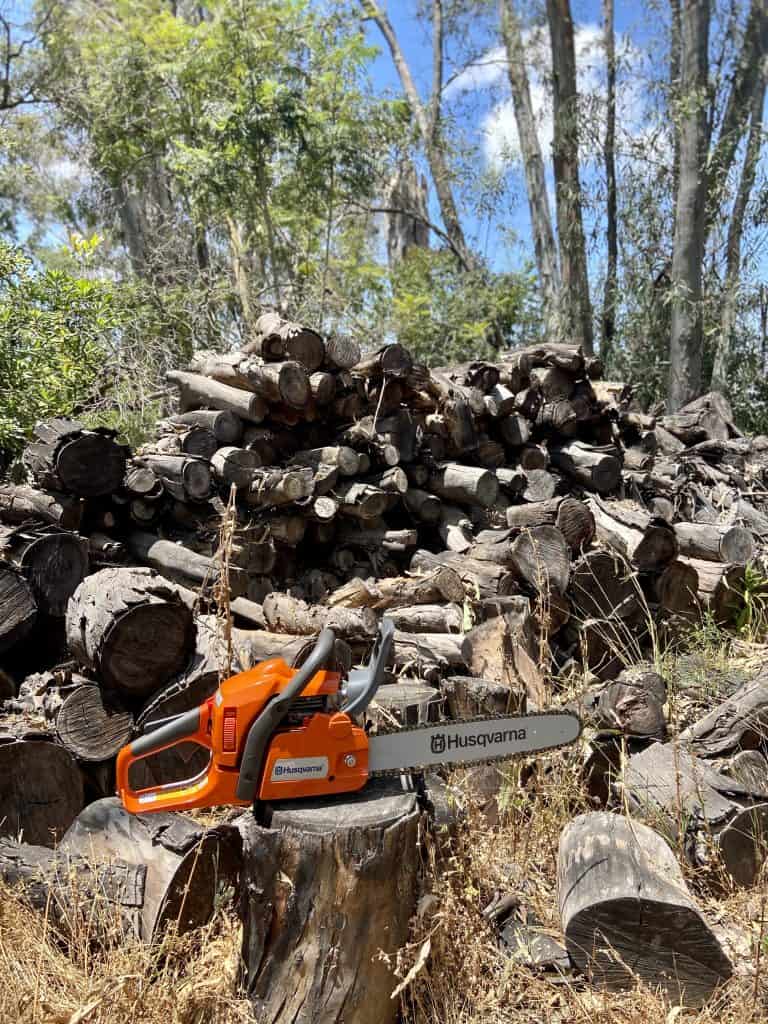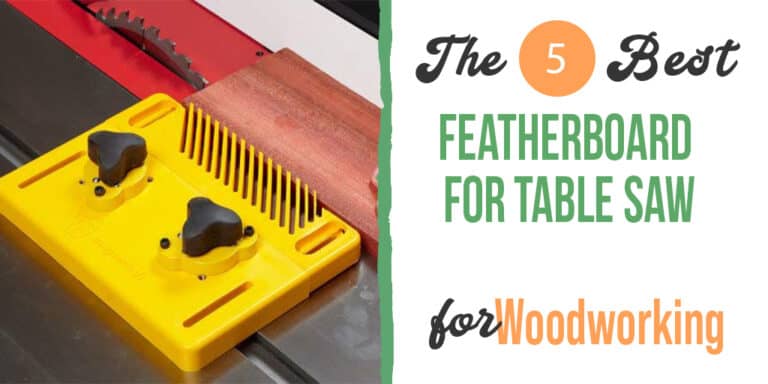Chainsaws are one of the most useful and widely-used power tools today. Since the engines in chainsaws need to run at a high RPM (rounds per minute) to provide enough cutting power, the engines tend to heat up rather quickly. Due to this, many chainsaw users have wondered whether chainsaws overheat.
Contents
Can Your Chainsaw Overheat?
Yes, your chainsaw can overheat if something is malfunctioning. A properly maintained chainsaw shouldn’t overheat when used under normal conditions. Chainsaws can malfunction when they overheat, which can also damage vital components.
You can prevent this by determining the underlying reason! Here are eight reasons (and solutions) for a chainsaw that’s overheating!
1. Chainsaw’s Chain Is Too Dull
When your chain is too dull, it can cause the motor to overheat due to the additional power required to operate the tool. A dull chain will decrease cutting quality, and it will take longer than usual to cut through materials.
Solution: Sharpen Your Chainsaw’s Chain
Resharpening a chainsaw chain is affordable and only takes fifteen minutes. The following YouTube video outlines the correct steps to sharpen a chain!
If you need to, you can also buy a new chainsaw chain and replace it yourself. If you’ve already sharpened your chain a few times and it isn’t a really high quality one, this might be the right route to go.
2. Incorrect Chain Is Being Used
Most chainsaw chains have specified uses. While some are intended for bucking, others can make clean cuts in wood. Using the wrong type of chain will lead to frequent issues with your chainsaw overheating.
Solution: Use The Right Type Of Chain
Always use the right type of chain for the type of cuts you want to make! When picking a suitable chain, you need to consider a chain’s pitch, gauge, and the total number of drive links.
3. Chain Is Too Loose Or Tight
A chain that’s too loose or tight can also cause overheating. While chains that are too tight put unnecessary strain on the engine, loose chains cause more friction. In both scenarios, an ill-fitting chain can cause your chainsaw to malfunction.
Solution: Install The Chain Correctly
Use your chainsaw’s tension screw to find the perfect balance for your chain. Turning the tension screw clockwise will tighten it, while turning it counterclockwise will loosen it.

4. Chain Isn’t Adequately Lubricated
Chains that aren’t correctly lubricated can cause your chainsaw to overheat due to metal-on-metal friction. Ultimately, too much friction can cause the chain to burn and puts frictional force on the engine.
Solution: Regularly Lubricate Chains
Many different lubricants can be used on chains, including vegetable and canola oils. With that being said, its best to use fresh chainsaw oil to lubricate your chain.
5. Wrong Oil-To-Fuel Ratio Was Used
Most chainsaws use two-stroke engines, which require a mix of both fuel and oil. By mixing oil into the fuel, the pistons moving inside the motor are lubricated. The wrong oil-to-fuel ratio can cause chainsaws to overheat.
Solution: Use The Right Oil-To-Fuel Ratio
While your chainsaw’s manual should specify the correct oil-to-fuel ratio, most models operate optimally with a 1:50 oil-to-fuel ratio. It’s also possible to purchase pre-mixed fuel for your chainsaw.
6. Chainsaw Exhaust Port Is Blocked
Since chainsaws use engines to operate, they need an exhaust port to dispel the fumes created by the engine during usage.
When the exhaust port gets blocked due to debris, the trapped fumes can cause your chainsaw to overheat internally. This is a bigger issue on larger, 50cc engine chainsaws.
Solution: Clean The Exhaust Port
Chainsaw users should routinely clean the exhaust ports of their tools. You can use a cloth soaked in a quality degreaser product to clean your chainsaw’s exhaust port.
7. Chainsaw Air Filter Is Clogged
Clogged air filters are more likely than a clogged exhaust port – and can also cause your tool to overheat!
Ultimately, the air filter ensures that the motor has sufficient ventilation, which is required for combustion. Since a lot of air passes through these filters, they will eventually get clogged with dust and debris.
Solution: Routinely Clean The Air Filter
Your chainsaw’s manual will provide instructions on how to access your chainsaw’s air filter. Generally, you’ll need to unscrew the outer cover before using a bristled brush to clean the air filter. The air filter’s cover should also be cleaned to ensure air can get through to the filter.
8. Chainsaw Isn’t Being Used Correctly
The uses for your chainsaw depend on its size, engine, bar, and chain. Larger 20″ chainsaws can handle large projects, like felling trees and cutting firewood. Smaller chainsaws, often battery operated models, are better suited for cutting small branches and yardwork.
Incorrectly using your chainsaw can result in the engine overheating. For example, using your chainsaw to cut down trees that are too big can cause the guide bar to get stuck, bend, and cause the motor to overheat.
Solution: Always Use Your Chainsaw Correctly
You can prevent overloading and overheating your chainsaw by using it correctly. Chainsaw users should never force their power tools to over-perform by cutting a load that’s too heavy.
If your chainsaw gets stuck in a tree, instead use a felling wedge to remove it than force your chainsaw to cut through the tree.
Frequently Asked Questions
How Do You Know When A Chainsaw Is Overheating?
An overheating chainsaw will feel warmer than usual. A change in sound or a decline in performance are also signs that your chainsaw is overheating and malfunctioning. A chainsaw that’s overheated will also give off dark smoke.
What Should You Do When Chainsaws Overheat?
Overheating chainsaws should be switched off immediately. Once your chainsaw is off, you can identify the underlying reason causing your chainsaw to overheat and apply the appropriate solution. Doing this will prevent damaging your power tool!
Can You Repair A Chainsaw That Overheats?
It’s possible to repair a chainsaw that’s overheating by promptly switching it off and applying the correct solution. However, if the chainsaw was damaged due to overheating, whether or not you can repair it depends on how much damage was sustained. In some cases, it will be cheaper (and easier) to replace a damaged chainsaw than repair it.
Conclusion
There are many possible reasons for an overheating chainsaw, including issues with the chain, using the wrong oil-to-fuel ratio, and clogged components like air filters. An overheated chainsaw is at risk of malfunctioning, which can severely damage internal components. Finding the underlying cause will help you fix the issue!
![Best Battery Powered Chainsaw Reviews – [2023 Buyer Guide] 3 Best Battery Powered Chainsaw Reviews – [2023 Buyer Guide] Best Battery Chainsaw](https://brandisawyer.com/wp-content/uploads/2020/06/best-battery-chainsaw.jpg)
![Best Chainsaw Helmets Reviews for 2023 – [Top Picks & Buyer’s Guide] 4 Best Chainsaw Helmets Reviews for 2023 – [Top Picks & Buyer’s Guide] Best Chainsaw Helmet](https://brandisawyer.com/wp-content/uploads/2020/06/Best-Chainsaw-Helmet.jpg)
![Best Scroll Saw Blades in 2023 – [Top List on The Market] 5 Best Scroll Saw Blades in 2023 – [Top List on The Market] Scroll Saw Blades](https://brandisawyer.com/wp-content/uploads/2020/06/shutterstock-571652014-768x512.webp)


